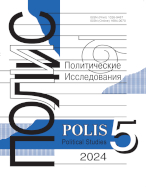“New World Order”:
To the Methodology of Analysis
DOI: 10.17976/jpps/2003.05.04
Batalov Ye.Ya. “New World Order”: To the Methodology of Analysis . – Polis. Political Studies. 2003. No. 5. https://doi.org/10.17976/jpps/2003.05.04
The author rates as a characteristic feature of most of the modern conceptions of new world order, eschatological element whose appearance, he holds, is attributable to a specific tinge of world outlook, which usually emerges in “on-the brink” or “on-the-eve” situations. In his appraisal of available models of new world order, he stresses that many of them are based on ideas and theses which are not theoretically founded and politically relevant. Among these he rates the postulates of pole-dominated structure of the forthcoming world order, of its capitalist foundation, and of the United States’ global leadership. In the major part of the article, the author thoroughly investigates the terminological chain: “order” — “social order” — “political order” — “world political order”, and, in the Conclusion, describes the most likely parameters of a world arrangement that might take shape in the time to come. With resort to the apophatic method, he describes such arrangement as “poleless”, resting on foundations not identical to post-classical capitalism, and poorly connected with liberal ideas. In the author’s opinion, new world order will be characterized by heightened dynamism of changes, which will require equally dynamic change of the algorithms of regulating them.
See also:
Melville A.Yu.,
On Trajectories of Post-Communist Transformations. – Polis. Political Studies. 2004. No2
Fyodorov K.G.,
The Policy in the Sphere of Local Taxation in Russia. – Polis. Political Studies. 2003. No4
Bube M.,
The Role of Parties in the Formation of Political System of Post-War Germany. – Polis. Political Studies. 2004. No6
Peregudov S.P.,
Corporate Capital and Power Institutions: Who Plays the Master?. – Polis. Political Studies. 2002. No5
Kazantzev A.A.,
Intelligentsia and Structural Innovations in Political Expanse (An Essay of Comparative Analysis). – Polis. Political Studies. 2007. No1





.jpg)






 print
print
.jpg)
.jpg)